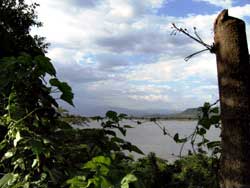El Salvador: Frontline of global struggle over water privatization
By
Heather Cottin
San Salvador, El Salvador
Published Sep 3, 2007 6:15 PM
It is the simplest thing. In the industrialized world, a billion people do it
10 times a day. They turn on the water. They drink it, wash with it, brush
their teeth and cook with it. It is reliable, hot or cold, potable and
cheap.
|
Lake Suchitlán
WW photo: Heather Cottin
|
Still, in these countries, people buy bottled water. They don’t need to,l
but they buy it all the same. Bottled water sales in the U.S. alone came to
$8.3 billion in 2003. It isn’t special water. Recent reports show that
bottled water sold by Coca-Cola, Pepsi and Nestlé, its leading producers,
get their product from municipal water systems. Their profit margins are
astronomical.
Last year human beings spent $100 billion on bottled water, three times more
than the amount needed to meet the United Nation’s goals of giving
everyone access to water by 2015. ( Michael Blanding, “The Bottled Water
Lie,” AlterNet, Oct. 26, 2006)
If these companies have their way, they will be taking control over municipal
water systems, rivers, lakes and streams all over the world.
They have already started.
Billions of people lack access to safe drinking water. It does not run in their
taps. Balancing heavy jugs on their heads, women and children walk long
distances in Latin America, the Caribbean, Asia, the Middle East and Africa to
bring water to their homes. According to Cornell University researchers,
diseases resulting from water contamination cause 40 percent of all deaths
worldwide.
In the Third World, as in the industrialized capitalist countries, corporations
deplete aquifers and lakes, rivers and streams and sell the water at a huge
profit.
In countries like Bolivia, the Philippines, the U.S. and El Salvador people are
organizing to fight water privatization.
In El Salvador in early July, campesinos and workers from the Faribundo
Martí National Liberation Front protested in Suchitoto on the day the
country’s president, Antonio Saca, came to the city to promote a law that
would privatize water. The military who accompanied Saca used El
Salvador’s anti-terrorist act, modeled on the U.S. Patriot Act, to
repress the protest.
Fourteen people face sentences of up to 60 years for marching against water
privatization.
Nearby Lake Suchitlán has no water treatment plant; most of the residents
pay two dollars for a jug of potable water that might last a family two days.
Although El Salvador has many lakes and rivers, industrial waste and sewage
pollute the water and no laws exist to protect the environment.
In El Salvador 60 percent of the population is unemployed and the average daily
wage is about $5.00. Privatization has tripled prices for electricity and
telephones. Water privatization would be a disaster.
Since the Suchitoto arrests, El Salvador has been tense with repressed anger.
On July 25 students protesting at the National University in San Salvador in
support of the Suchitoto 14 were brutally put down. The students responded with
revolutionary murals and graffiti: “No to the Anti-Terrorist Law.”
Saca’s right-wing ARENA party is increasing military and police presence
throughout the country.
Protests against water privatization have spread around the globe, from
Bolivia, where militant actions presaged Evo Morales’s rise to power, to
Stockton, Calif., where water activists defeated a privatization plan. Recently
protesters tore up their water bills in Quezon City in the Philippines.
Water privatization is the most cynical and cruelest act. People must have
water, so the World Bank, the International Monetary Fund and all the
“Free Trade” agreements dictate that the poor must pay for it. But
one year’s profits from the bottled water industry would provide enough
money to build the infrastructure for safe water for everyone on earth.
During a recent struggle against water privatization in the Philippines, one
activist said, “Water, like freedom, is essential for humans to live with
dignity. Unfortunately nowadays, this life-giving liquid is being traded by
profit-driven private corporations, with the collusion of this debt-saddled
government, as a consumer product, which means that people’s right to
water now depends on the contents of their pockets.” (GMA-TV News)
This fight for water is at the frontline of the struggle against neoliberal
capitalist restructuring. And while the water privatizers tout the
effectiveness of market forces to take over the world’s water supply, the
arrests in Suchitoto show that when they can’t get what they want through
the “free market,” they have the brutal capitalist state to fall
back on.
Revolutions come when people realize that they have to organize to defend their
basic human rights. And what is more basic than water?
Articles copyright 1995-2012 Workers World.
Verbatim copying and distribution of this entire article is permitted in any medium without royalty provided this notice is preserved.
Workers World, 55 W. 17 St., NY, NY 10011
Email:
[email protected]
Subscribe
[email protected]
Support independent news
DONATE


